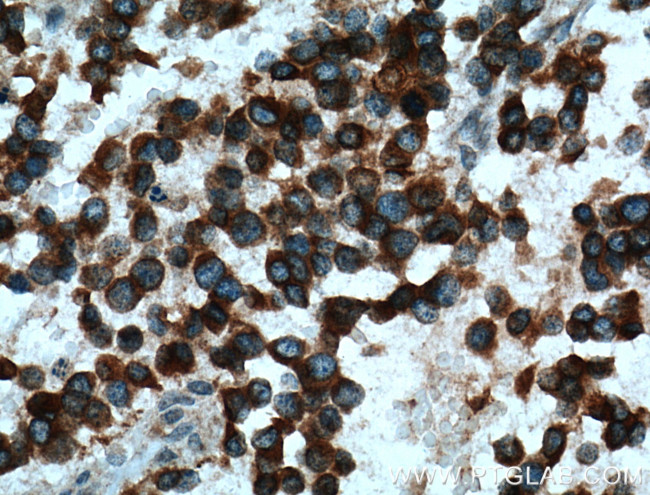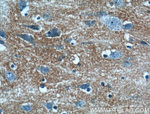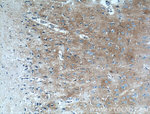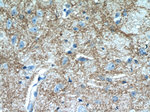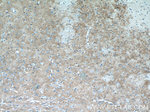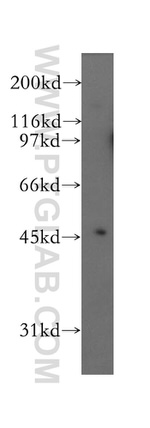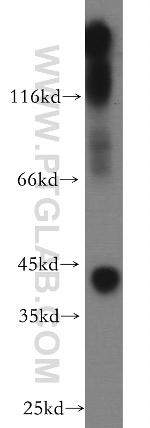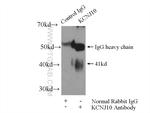Search Thermo Fisher Scientific
Product Details
12503-1-AP
Species Reactivity
Published species
Host/Isotype
Class
Type
Immunogen
Conjugate
Form
Concentration
Purification
Storage buffer
Contains
Storage conditions
Shipping conditions
Product Specific Information
Immunogen sequence: ETIRFSQHA VVASHNGKPC LMIRVANMRK SLLIGCQVTG KLLQTHQTKE GENIRLNQVN VTFQVDTASD SPFLILPLTF YHVVDETSPL KDLPLRSGEG DFELVLILSG TVESTSATCQ VRTSYLPEEI LWGYEFTPAI SLSASGKYIA DFSLFDQVVK VASPSGLRDS TVRYGDPEKL KLEESLREQA EKEGSALSVR ISNV (224-426 aa encoded by B C034036)
Target Information
The KIR (for inwardly rectifying potassium channel) family of potassium channels possess a greater tendency to allow potassium to flow into the cell rather than out of it. KIR4.1, also known as Kir1.2, is highly expressed in brain including glial cells, astrocytes and cortical neurons. KIR4.1 is also expressed in myelin-synthesizing oligodendrocytes and is crucial to myelination in the developing nervous system. The gene encoding human KIR4.1 maps to chromosome 1. KIR4.2, also known as Kir1.3, is expressed in kidney, lung, heart, thymus and thyroid during development. The gene encoding human KIR4.2 maps to chromosome 21 in the Down syndrome chromosome region 1, and KIR4.2 may play a role in the pathogenesis of Downs syndrome. KIR5.1 forms functional channels only by coexpression with either KIR4.1 or KIR4.2 in the kidney and pancreas.
For Research Use Only. Not for use in diagnostic procedures. Not for resale without express authorization.
Bioinformatics
Protein Aliases: ATP-dependent inwardly rectifying potassium channel Kir4.1; ATP-sensitive inward rectifier potassium channel 10; ATP-sensitive inward rectifier potassium channel KAB-2; BIR10; BIRK1; BIRK10; Brain-specific inwardly rectifying K(+) channel 1; glial ATP-dependent inwardly rectifying potassium channel KIR4.1; Inward rectifier K(+) channel Kir1.2; Inward rectifier K(+) channel Kir4.1; inward rectifier K+ channel KIR1.2; KCNJ13 PEN; kir4.1; Potassium channel, inwardly rectifying subfamily J member 10; potassium channel, inwardly rectifying subfamily J, member 10; potassium inwardly-rectifying channel, subfamily J, member 10
Gene Aliases: BIR10; BIRK-1; BIRK-10; Kab-2; KCNJ10; KCNJ13-PEN; KIR1.2; KIR4.1; SESAME
UniProt ID: (Human) P78508, (Rat) P49655, (Mouse) Q9JM63
Entrez Gene ID: (Human) 3766, (Rat) 29718, (Mouse) 16513

Performance Guarantee
If an Invitrogen™ antibody doesn't perform as described on our website or datasheet,we'll replace the product at no cost to you, or provide you with a credit for a future purchase.*
Learn more
We're here to help
Get expert recommendations for common problems or connect directly with an on staff expert for technical assistance related to applications, equipment and general product use.
Contact tech support
